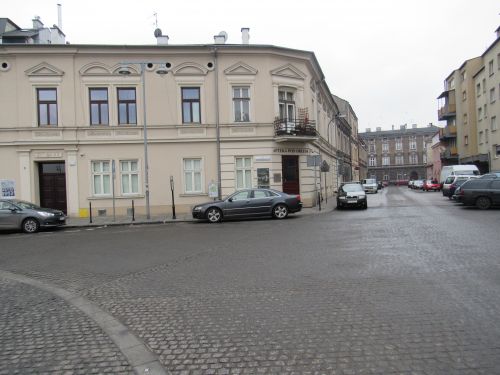Tadeusz Pankiewicz - Krakow Ghetto Account
Krakow - Eagle Pharmacy - March 2016 - (Chris Webb)
Krakow Ghetto – June 1942
On June 4, 1942, it was the Jews of Krakow who faced the perils and uncertainties of a round-up. A Polish Catholic, Tadeusz Pankiewicz, whose pharmacy was situated in Harmony Square, the very centre of the ghetto, witnessed the round-up of thousands of Jews. By the following morning seven thousand Jews had been assembled. There they were kept throughout that hot summer morning, and then driven to a side-track near the Plaszow railway station, where they boarded cattle wagons which took them to the Belzec death camp.
Tadeusz Pankiewicz provided an eyewitness account of the deportations:
Old people, women and children pass by the pharmacy windows like ghosts. I see an old woman of around seventy years, her hair loose, walking alone, a few steps away a larger group of deportees. Her eyes have a glazed look; immobile, wide open, filled with horror, they stare straight ahead. She walks slowly, quietly, only in her dress and slippers, without even a bundle, or handbag. She holds in her hands something small, something black, which she caresses fondly and keeps close to her old breast. It is a small puppy – her most precious possession, all that she saved and would not leave behind.
Laughing inarticulately gesturing with her hands, walks a young deranged girl of about fourteen, so familiar to all inhabitants of the ghetto. She walks barefoot, in a crumpled nightgown. One shuddered watching the girls laughing , having a good time. Old and young pass by, some dressed, some only in their underwear, hauled out of their beds and driven out. People after major operations and people with chronic diseases went by…….
Across the street from the pharmacy, out of the building at 2 Harmony Square, walks a blind old man, well known to the inhabitants of the ghetto; he is about seventy years old, wears dark goggles over his blind eyes, which he lost in the battles on the Italian front in 1915, fighting side by side with the Germans. He wears a yellow armband with three black circles on his left arm to signify his blindness. His head high, he walks erect, guided by his son on one side, by his wife on the other. ‘He should be happy he cannot see, it will be easier for him to die,’ says a hospital nurse to us. Pinned on his chest is the medal he won during the war. It may, perhaps, have some significance for the Germans. Such were the illusions in the beginning.
Immediately after him, another elderly person appears, a cripple with one leg, on crutches. The Germans close in on them; slowly in dance step, one of them runs towards the blind man and yells with all his power, ‘Schnell!’ ‘Hurry!’ This encourages the other Germans to start a peculiar game.
Two of the SS men approach the old man without the leg and shout the order for him to run . Another one comes from behind and with the butt of his rifle hits the crutch. The old man falls down. The Germans scream savagely, threatens to shoot. All this takes place right in the back of the blind man who is unable to see, but hears the beastly voices of the Germans, interspersed with cascades of their laughter. A German soldier approaches the cripple who is lying on the ground and helps him to rise. This help will show on the snapshot of a German officer who is eagerly taking pictures of all scenes that will prove ‘German help in the humane resettlement of the Jews.’
For a moment we think that perhaps there will be at least one human being among them unable to stand torturing people one hour before their death. Alas, there was no such person in the annals of the Krakow ghetto. No sooner were they saturated with torturing the cripple than they decided to try the same with the blind war invalid. They chased away his son and wife, tripped him and rejoiced at his falling to the ground. This time they even did not pretend to help him and he had to rise by himself, rushed on by horrifying screaming of the SS men hovering over him. They repeated this game several times, a truly shattering experience of cruelty. One could not tell from what they derived more pleasure, the physical pain of the fallen invalid or the despair of his wife and son standing aside watching helplessly.
The shots are echoing all over the ghetto, Pankiewicz added.
Sources
M. Gilbert, The Holocaust - The Jewish Tragedy, published by Collins, London 1986
Photograph: Chris Webb
© Holocaust Historical Society 2019


